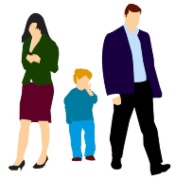 It used to be considered that divorce itself had a significantly negative effect on children. A large body of research has now been done on the effects of divorce on children. A major finding is that it’s the conflict between the parents that is the single most important factor in children’s post-divorce adjustment. Such conflict is most likely to be damaging when it plays out in the presence of the children.
It used to be considered that divorce itself had a significantly negative effect on children. A large body of research has now been done on the effects of divorce on children. A major finding is that it’s the conflict between the parents that is the single most important factor in children’s post-divorce adjustment. Such conflict is most likely to be damaging when it plays out in the presence of the children.
Children’s psychological reactions to their parents’ divorce vary in degree depending on three main factors:
- the quality of their relationship with each of their parents before the separation;
- the intensity and duration of the parental conflict; and
- the parents’ ability to focus on the needs of the children in their divorce.
Older studies indicated that boys tended to have more adjustment problems than girls. More recent studies show that boys and girls suffer equally; they just differ in how they suffer. Boys often display their symptoms externally. Girls are more likely to internalize their distress.
For teenagers, most eventually adjust to divorce and view it as having been constructive. But about a third do not. The intensity of the divorce battle has been shown to play a key role in creating unhealthy reactions in teenagers.
Post-Divorce Effects on Children
The drop in standard of living resulting from parental income having to support two households often adversely affects children. These effects can be in areas such as proper nutrition, involvement in extracurricular activities, clothing and school choices.
Sometimes divorce forces a stay-at-home parent to enter the workforce. This results in children spending more time with child care providers.
Sometimes a child is called upon to take on too much for their age and maturity. This may be because one or both parents are not functioning well as parents. Or it can occur when a parent talks to a child about how hurt they are by the other parent or how bad the other parent is.
The impact of essentially losing a father or mother is not likely to be diminished by the introduction of step-parents. It seems that no one can replace Mom and Dad.
A child’s continued involvement with both parents after divorce helps them have realistic and better-balanced future relationships with others. It’s extremely helpful in this regard for a child to feel secure in their relationship with each parent.
It’s important for each parent to encourage and support the children in having a good relationship with the other parent. Too often, one parent will undermine the parenting of the other.
Divorce also can have some positive affects for children. Single parents are often closer to their children than they were as married parents. Separated parents sometimes make a greater effort to spend quality time with their children and pay more attention to the desires and needs of the children. When children no longer have to live in a conflict-filled household, they experience freedom from the corresponding tension and fear.
Related Posts and Pages:







